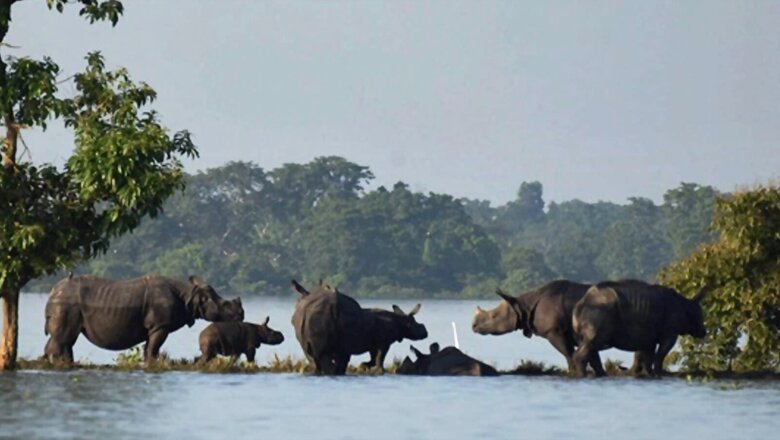
views
In a three-day programme, the Assam Forest Department began the 14th census of the one-horned rhinoceros at the Kaziranga National Park and Tiger Reserve on Saturday.
The forests of the Kaziranga National Park, a Unesco world heritage site, are home to the world’s largest population of Indian one-horned rhinoceroses. The last rhino census was held three years ago in 2018 and since then as many as 400 rhinos died as devastating floods swept Assam, even though the menace of poaching declined significantly.
Forest officials have identified 76 blocks and invited 60 enumerators and observers for this census.
Ramesh Gogoi, Divisional Forest Officer (DFO) of the Kaziranga National Park, told news agency ANI that the enumerators and observers have already moved to their respective places. “They will submit their counting reports to us today evening. We will make placement for the enumerators and observers for tomorrow also. We have identified 76 blocks and invited 60 enumerators and observers for this census and most of them have participated in the census,” Gogoi said.
To conduct the census, the national park will remain closed for visitors between March 26 and March 28.
Meanwhile, Pobitora Wildlife Sanctuary in Assam has registered an increase of five rhinoceros, taking the total count of the animal in the protected forest to 107, a forest official said. There are 50 female, 30 male and 27 cub rhinoceroses in the 38.81 sq km forest, which is the highest density of one-horned rhinoceros.
A two-day census of the animal was conducted from Monday and the wildlife sanctuary was divided into nine zones, with 11 numerators and nine supervisors appointed for the purpose. Apart from forest officials, members of rhino conservation organisations such as Aaranyak, WWF, Elephant Foundation and local NGOs also took part in the census.
A total of 102 rhinos were recorded during the 2018 census and there has been no incident of poaching reported from the wildlife sanctuary since 2014, the forest official said. The rhino population in Orang National Park has also increased by 24 to 125. A three-day rhino census will be conducted in Kaziranga National Park from March 26.
Once critically endangered, rhinos have been upgraded as vulnerable species by IUCN from 2009, and as per the 2018 census, Assam has 2,652 rhinos with Kaziranga having the highest population of 2,413.
Read all the Latest News India and Breaking News here




















Comments
0 comment